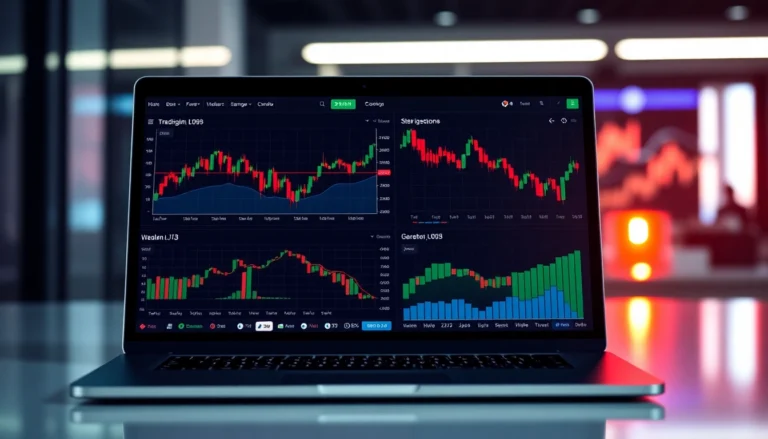
Overview of Cryptocurrency Trading in London
London continues to stand at the forefront of global financial innovation, with its dynamic cryptocurrency trading scene attracting both institutional and retail traders. The current market conditions are shaped by a combination of regulatory developments, technological advancements, and macroeconomic factors. As one of Europe’s premier financial hubs, London offers a robust ecosystem supported by a wide array of exchanges, trading platforms, and professional services. For traders looking to stay informed and make strategic decisions, understanding the latest trends and news in London’s crypto landscape is essential. To keep abreast of these developments, visit Cryptocurrency Trading News London for comprehensive updates.
Analyzing Latest Cryptocurrency Trading News in London
2.1 Recent Market Movements and Significant Events
London’s cryptocurrency market has recently experienced notable volatility, influenced largely by global economic signals and local regulatory discussions. Recently, Bitcoin has maintained a relatively flat trajectory, oscillating around key support and resistance levels, while Ethereum’s rally has slowed, reflecting broader cautious sentiment among investors. The decline in NFT market capitalization by approximately $1.2 billion highlights ongoing corrections in digital collectibles, yet the overall crypto industry remains resilient, with top assets like Bitcoin and Ether still commanding significant attention. Major events such as discussions around regulatory clarity and institutional entry have kept traders alert to potential shifts that could impact liquidity and price stability.
2.2 Impact of Global News on London Crypto Markets
Global financial news continues to exert a powerful influence on London’s crypto markets. For instance, remarks by US officials calling for rate cuts and calls for Fed resignation have led to fluctuations in the dollar, indirectly impacting Bitcoin and other cryptocurrencies traded in London. Likewise, geopolitical tensions and US-China trade relations influence commodity prices like oil and precious metals, which in turn affect crypto’s appeal as an alternative investment. London traders often interpret these signals to adjust their strategies, especially during periods of heightened uncertainty.
2.3 How Local News Influences Trading Strategies
Locally, regulatory announcements, market sentiment, and technological innovations define trading strategies. For example, reports that Meta is exploring partnerships to enhance its apps indicate increasing interest in integrating AI for better data analytics, which can inform trading decisions. Additionally, news about the UK’s regulatory stance on cryptocurrencies, including the Bank of England’s stance and upcoming legislation, is critical for traders. Such news can prompt shifts in market positioning, risk management tactics, and asset allocation, emphasizing the importance of real-time news monitoring and agile strategy adjustments.
Strategies for Effective Cryptocurrency Trading in London
3.1 Technical and Fundamental Analysis Approaches
Successful traders in London leverage both technical and fundamental analysis to navigate the volatile crypto landscape. Technical analysis involves studying price charts, identifying trendline patterns, support and resistance levels, and utilizing indicators like RSI, MACD, and Moving Averages. For example, a trader might observe that Bitcoin’s 200-week trendline remains intact, signaling potential bullish momentum if maintained. Fundamental analysis requires assessing news, regulatory updates, adoption trends, and macroeconomic factors impacting crypto valuations. Combining these approaches enhances decision-making, particularly in an environment where global events rapidly influence market sentiment.
3.2 Risk Management and Security Tips for Traders
Given the high volatility, robust risk management is essential. Implementing stop-loss and take-profit orders can help mitigate losses and secure gains. Diversification across different assets, like Bitcoin, Ether, and promising altcoins, reduces dependency on a single market movement. Security also remains paramount; traders should utilize hardware wallets, enable two-factor authentication, and avoid sharing sensitive information. In London, traders benefit from access to regulated exchanges with strong compliance standards, providing additional security layers.
3.3 Leveraging Local Market Insights for Better Trades
Deep understanding of London’s market dynamics can significantly improve trading outcomes. Staying informed about UK-specific regulatory developments, taxation policies, and financial news allows traders to anticipate market reactions. Engaging with local trading communities and expert networks can reveal subtle market nuances. Additionally, attending webinars, forums, and industry events familiarizes traders with emerging opportunities and risks, fostering a more strategic approach aligned with London’s unique financial ecosystem.
Tools, Platforms, and Resources for London Traders
4.1 Top Trading Platforms and Software in London
London-based traders utilize a spectrum of trading platforms, both global and local. Leading exchanges like Binance, Coinbase, and Kraken offer extensive functionalities, high liquidity, and compliance with UK regulations. Proprietary software such as MetaTrader 4/5, TradingView, and advanced analytical tools enhance trading precision. Some platforms, like eToro, incorporate social trading features, enabling traders to follow successes and share insights in real-time, which is particularly supported by London’s vibrant crypto community.
4.2 News Sources and Analytical Tools Specific to London Market
Staying ahead requires reliable news sources; in London, reputable outlets like Financial Times and CityAM provide in-depth coverage of regulatory updates and market trends. Analytical tools like CoinMarketCap, CoinGecko, and Glassnode offer real-time data analytics on crypto asset movements and network metrics. For traders seeking local insights, platforms integrating UK-specific news feeds and economist commentary help build a comprehensive market picture, enabling better-informed trades.
4.3 Education and Community Resources for Traders
London’s thriving crypto education scene offers courses, workshops, and seminars through institutions like City University’s financial programs and industry seminars hosted at fintech hubs. Meetup groups, online forums, and local trading clubs foster community learning and networking. Such resources help traders develop their skills, share strategies, and stay resilient amid market challenges. Additionally, many online platforms provide demo accounts for practice, crucial for mastering trading mechanics before risking real capital.
Future Outlook and Opportunities in London’s Cryptocurrency Market
5.1 Emerging Trends and Potential Growth Areas
London’s crypto future is promising, driven by innovations such as DeFi, NFTs, and the integration of artificial intelligence in trading platforms. The increasing institutional adoption and potential central bank digital currency (CBDC) initiatives are poised to enhance credibility and liquidity. Opportunities also lie in tokenized assets, including real estate and commodities, creating new investment avenues. Additionally, the UK’s focus on establishing a clear yet flexible regulatory environment can attract more startups and investors, fostering sustainable growth.
5.2 Regulatory Changes and Their Impact on Trading
Evolving regulations remain a critical factor. Recent statements by UK regulators suggest that balancing consumer protection with innovation will be key. Clarifications on taxation, AML procedures, and licensing processes will shape trading practices significantly. Proactive compliance strategies and engagement with regulatory developments can serve as a competitive advantage for traders and firms in London, setting a foundation for long-term success.
5.3 How Traders Can Prepare for Future Market Shifts
Staying adaptable is crucial. Traders should continuously update their knowledge, diversify holdings, and employ advanced analytics. Incorporating AI-driven insights and automation can enhance reaction times to market shifts. Establishing partnerships with educational resources, subscribing to real-time news feeds, and engaging with local regulatory bodies will also prepare traders for an increasingly complex environment, ensuring resilience and growth potential.



